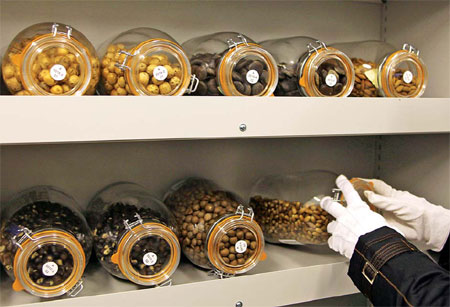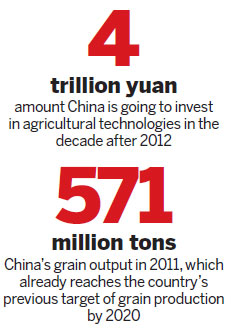Letting the grain take the strain
Updated: 2012-03-05 09:07
By Zhou Siyu (China Daily)
|
||||||||
|
A seed bank in Kunming, Yunnan province. China's policymakers have vowed to increase investment in the seed industry to upgrade the country's agricultural sector. [Li Jiuhong / for China Daily] |
The central government has thrown the focus firmly on food security this year
BEIJING - For those who can sense the way the wind is blowing in China, it is time to sow seeds. During the past nine years, the government has been making a concerted effort to advance the agricultural sector. That's hardly a surprise, given that half of the population lives in rural areas, yet this year's effort is much more down to earth.
Early every year, China's central government reveals its priority industry by releasing the first major policy proposal, dubbed the "No 1 document". Since 2004, each document has tackled aspects of the agricultural sector. Published on February 1, this year's document focused on the development of agricultural technology.
The publication partly reflected the country's unstinting efforts to maintain food security. Chinese farmers have increased the national grain harvest for eight consecutive years since 2003. In 2011, grain output rose to a record 571 million tons, an increase of 4.5 percent year-on-year. Meanwhile, the production volume has already reached the government's 2020 output target for grain, according to the National Bureau of Statistics.
But shrinking natural resources will pose a grave challenge to the production of bumper harvests in the years to come, said agricultural officials and analysts.
In 2012, the sector will be under "great pressure" to achieve yet another increase in grain yields, said Chen Xiaohua, vice-minister of agriculture, in a recent interview.
To boost the development of agricultural production, the government plans to rely on advanced technology. According to this year's No 1 document, the central government will pump more money into the research and development of agricultural technologies. The total amount invested in areas such as seed breeding, livestock and agricultural logistics will stand at more than 4 trillion yuan ($636 billion) in the decade after 2012, according to reports in the domestic media.
China needs to catch up with more advanced economies by developing cutting-edge agricultural technology, said Chen Mengshan, the chief economist at the Ministry of Agriculture. At present, more than 90 percent of the country's high-end varieties of flowers and vegetables are imported, according to the ministry's data. "A considerable number of research projects are following advanced technologies (across the world)," he said.
Seeds of concern
Out of all the agricultural sectors, the seed industry was singled out in the document. "The seed industry will lead the development of the agricultural industry," the document asserted. "More investment will go to fundamental research into the seed industry ... and aid the development of new varieties."
Seeds have long been a headache for many in the Chinese agricultural industry. However, it's not their performance that's the problem; it's their provenance. Industry data show that corn seeds developed by Pioneer Hi-Bred International Inc - a subsidiary of DuPont de Nemours and Co - and its Chinese joint ventures, were sown in more than 2 million hectares of the country's cornfields up to 2011. One of Pioneer's seed varieties has become China's third most popular corn seed in recent years, said analysts.
In terms of vegetable seeds, foreign companies have taken a 15 percent share of the Chinese market, according to data from the Ministry of Agriculture. That figure represents a formidable dominance in the nation's highly segmented seed market, according to analysts.
China has more than 8,000 domestic seed companies. However, most are small outfits with limited ability in terms of research and development. "They are vulnerable in the face of their foreign rivals," said Ma Wenfeng, a senior analyst at Beijing Orient Agribusiness Consultant Ltd, one of the largest consultancies in the industry.
The No 1 document was the latest in a slew of government measures that, since April, have tried to regulate the market and spur development of the industry. The government will "raise the registration threshold for seed companies and encourage mergers and acquisitions between them", while "cracking down on fake and counterfeit seeds in the market", the document said.

 Relief reaches isolated village
Relief reaches isolated village
 Rainfall poses new threats to quake-hit region
Rainfall poses new threats to quake-hit region
 Funerals begin for Boston bombing victims
Funerals begin for Boston bombing victims
 Quake takeaway from China's Air Force
Quake takeaway from China's Air Force
 Obama celebrates young inventors at science fair
Obama celebrates young inventors at science fair
 Earth Day marked around the world
Earth Day marked around the world
 Volunteer team helping students find sense of normalcy
Volunteer team helping students find sense of normalcy
 Ethnic groups quick to join rescue efforts
Ethnic groups quick to join rescue efforts
Most Viewed
Editor's Picks

|

|

|

|

|

|
Today's Top News
Health new priority for quake zone
Xi meets US top military officer
Japan's boats driven out of Diaoyu
China mulls online shopping legislation
Bird flu death toll rises to 22
Putin appoints new ambassador to China
Japanese ships blocked from Diaoyu Islands
Inspired by Guan, more Chinese pick up golf
US Weekly

|

|









